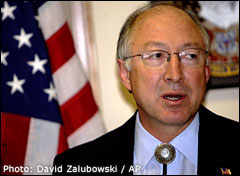
At his Senate confirmation hearing on Thursday, Interior Secretary nominee Ken Salazar said he would promote sound environmental and energy policies through his role in the new administration. His former colleagues on the Energy and Natural Resources Committee seemed to think he'd do a fine job.</p> <p>Salazar pledged to "clean up the mess" at the Department of Interior, which has seen <a href="https://grist.org/article/friends-in-flow-places/index.html">controversies over non-collection of oil royalties</a> and an embarrassing <a href="https://grist.org/article/grease-is-the-way-we-are-dealing">sex, drugs, and bribery scandal</a> within the Minerals Management Service.
He said he would revisit some of the more contentious rules put out by the Bush administration. “We will review what decisions have been made to see whether there is action necessary to make sure that they’re in compliance with the law and to make sure they’re in compliance with the science,” he said.
Energy issues were central during the hearing. “If confirmed, I will remain committed to helping our nation reduce its dangerous dependence on foreign oil,” said Salazar. “President-elect Obama believes, as I do, that our foreign oil dependence is a grave threat to our national security, our planet, and our economy.”
“I will work to modernize our interstate electrical grid, expand the use of renewable energy like solar and wind on public lands, and help tribes develop renewable energy resources on their lands,” he continued.
On the subject of more conventional fuel sources, Salazar said he would advocate for “wise use” of coal, oil, and natural gas and “responsible energy development” in areas like the National Petroleum Reserve-Alaska. He also said he would prioritize the construction of the Alaska natural-gas pipeline. “But as we develop our natural resources, we must adhere to the principles of good stewardship, and we must protect our nation’s most treasured landscapes,” he said.
Sen. Richard Burr (R-N.C.) asked Salazar under what conditions he would consider offshore oil and gas drilling. Salazar avoided specifics, noting that there may be some areas where expansion is appropriate, while there are “other places that are off limits.” He did, however, agree to a request from Sen. Robert Menendez (D-N.J.) to consult with coastal states on the matter. “We need to make sure … that those communities and those states that are going to be most affected certainly have a voice and are at the table,” said Salazar.
Salazar was asked about his position on oil-shale development. He has vehemently opposed the Bush administration’s efforts to lease public lands in the West for oil shale. While Salazar was less strident at the hearing, he said he would proceed with caution on oil-shale development. “We need to look at it as part of a comprehensive energy plan, but we ought not to be reckless in moving forward,” he said.
He noted that energy experts think commercial-scale oil-shale projects are still at least four years away, and thus the Bush administration’s rush to sell leases has been premature. “My question has become, why do we need to move along with commercial leasing at this point?” he said.
The new Colorado Democrat on the committee, Mark Udall, asked Salazar about coal. “Coal is a controversial subject,” Salazar replied. “The fact of the matter is it powers today much of America, and there are lots of jobs it creates.”
“The challenge is how we create clean coal,” he continued. “I believe that we will move forward with the funding of some of those demonstration projects so we can find ways to burn coal that don’t contribute to climate change … I will certainly be an advocate of making that happen.”
Burr asked Salazar for his thoughts on firearms being allowed in national parks, a controversial rule change carried out last month by the Bush administration.
“Let me say first that the president-elect has a good respect for the Second Amendment,” said Salazar. “Secondly, I grew up with a gun often next to me, either watching sheep out on the prairie, or at home next to me for self protection, so I have a sense of what gun ownership means … This particular rule is not one that I have yet reviewed … I’ll take a look at it in the context of what makes sense for national parks and for the Second Amendment.”
Salazar’s warm reception at the hearing indicates that, as expected, he’ll sail through confirmation in the Senate. Energy and Natural Resources Chair Jeff Bingaman (D-N.M.) offered high praise: “President-elect Obama could not have chosen a better nominee. As a Westerner who has farmed and ranched, who has practiced water law, and served in state government before coming to the Senate, Sen. Salazar understands the West and the special needs of the public-land states,” said Bingaman.
Tony Massaro of the League of Conservation Voters lauded Salazar in a statement today, urging the Senate to move forward with his confirmation. “For 27 years, I have watched Ken Salazar stand up for Colorado’s natural resources and know that he will be a thoughtful and effective steward of the land on which we live, the water we drink, and the resources we share,” said Massaro. “He is a man of integrity, commitment, and a firm belief that science should guide environmental decisions. When America’s resources are at stake, he will ask the right questions and demand the right answers.”
Other environmentalists, particularly from grassroots groups in the West, are less enthused. On Thursday, WildEarth Guardians and more than 100 other conservation groups and scientists issued a letter criticizing Salazar, noting his “hostility to Endangered Species Act enforcement and deference to agriculture in particular.”
“Ken Salazar does not bring the change we need at Interior,” said WildEarth Guardians spokesperson Nicole Rosmarino. “Salazar will not take strong stances on behalf of science and environmental protection and is not up to the task of undoing the enormous damage the Bush administration has done to public lands, endangered species, and the credibility of the Department of the Interior over the last eight years.”

